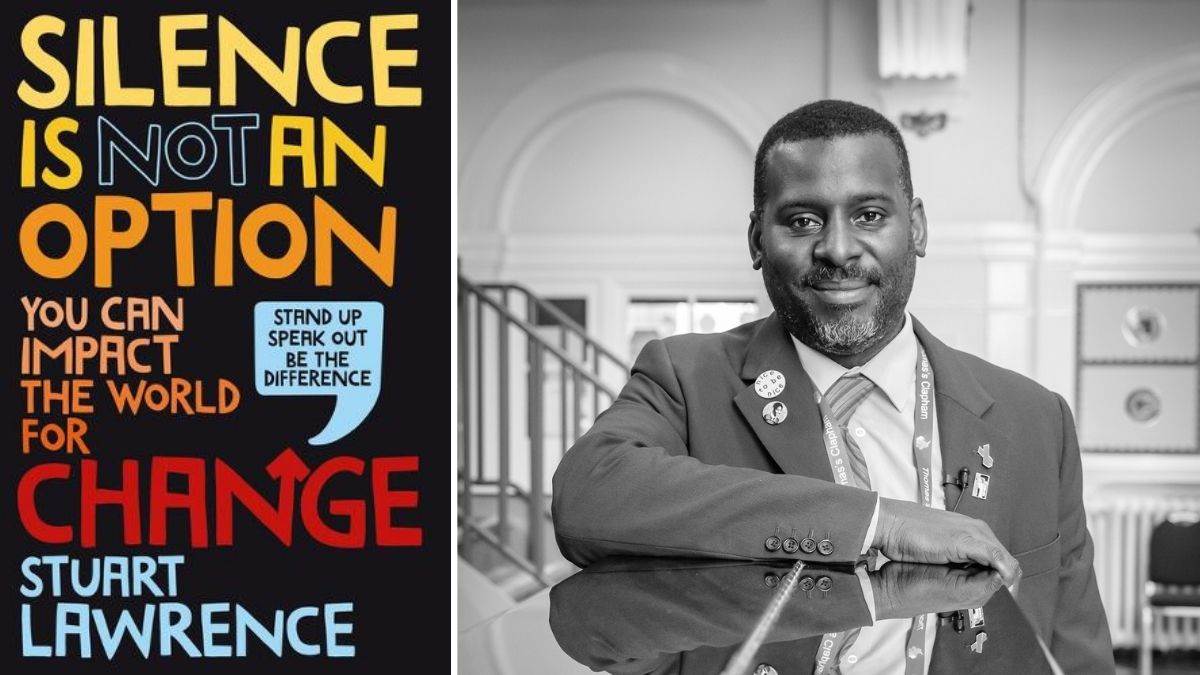Stuart Lawrence: How the power of reading can help us through difficult times
Published on: 22 April 2021
After he lost his brother Stephen in a racially motivated attack, Stuart Lawrence found strength and comfort in reading. Today he is a strong advocate for the power of books as a way of steering our future. His first book, Silence is Not An Option, encourages young people to use their voice for change.

"I admired Stephen like you would admire a superhero."
My big brother, Stephen Lawrence, was tragically murdered in 1993 in a racially motivated attack. It was great having someone to look up to, do things with and grow up with. I admired Stephen like you would admire a superhero. For Stephen to become the victim of a racist murder was a massive blow for me. It was something I never imagined could happen. There were six attackers and it wasn’t until 2012 that two of the attackers were jailed. When I was told what had happened, I went through a rush of emotions: sadness, anger, shock, disbelief and confusion. I wanted to try and find out what had happened. I felt I could help in some way and would walk down the road where the murder took place, playing everything over in my mind. Looking back, that probably wasn’t the best way of coping, but it was the way I dealt with losing my brother at the time.
Not long after Stephen’s death, my family and I had the privilege of meeting Nelson Mandela. Nelson Mandela spent most of his life fighting for people’s rights, even when he was imprisoned for 27 years. He had only been a free man for three years when we met him and yet here he was, selflessly helping our community. His presence really changed my brother’s case. He became a massive inspiration to me. We need more strong adult role models like Nelson leading the way.
A peek into other worlds
Reading has always been a great coping mechanism for me. It helps your imagination to develop and allows you to gain knowledge and insight into other topics, worlds and cultures. My favourite books have led me on a journey of discovery, self-reflection and curiosity. If I had never read Nelson Mandela’s life story and stepped into his world through my imagination, I would have never been able to fully comprehend the power of him visiting my family when my brother, Stephen, passed away.
Books can give you a peek into other worlds, and those other worlds can help you to imagine what your future might hold. Through my work within the education sector and from being a student myself, I have also found libraries a fantastic resource that often get overlooked, especially now that we have instant access to knowledge through our phones and computers. Outside of pandemics, libraries are a quiet, safe place where you can unplug from the world and become engrossed in a book. As a child, it was one of my favourite places to go to on the weekend. Librarians are great assets that should be utilised more – I remember my librarian giving me recommendations on authors and books they thought I might like.
As a child, one of my favourite authors was Roald Dahl. He had this amazing ability to create magical places and when I read his books I felt as though I was part of something special. My son Theo’s favourite author is David Walliams – the simplicity and humour of his stories captivate Theo's imagination and keep him wanting more.
The power of reading
Reading studies also show that reading for at least six minutes before you go to bed lowers stress by 68 per cent! It gets the body ready for sleep and relaxes the muscles. Plus, it boosts brainpower and creativity. Spending a bit of time jotting down some notes about your day, including what lessons you learned and how you felt, can help you process your thoughts before you go to sleep.
I want to challenge you to try and not use your phone, or any other screen, in the hour before you go to bed for one week. Write down what you have done each day instead of using a screen during that hour. Perhaps you could write down five things that you feel grateful for every day and see how your attitude changes. Our minds like to hold on to the negatives. We can have a great day and then one bad thing can happen that ruins everything. Writing down five positive things every day can help us keep things in perspective.
What other people think doesn't matter
Like most people, I have been through personal challenges. I have dyslexia, and there were times when I wasn’t able to complete tasks to my mum’s extremely high standards. Even when I became an adult, I still had a feeling of falling short, but I made the decision to build a positive attitude. I focused on what I was good at and accepted what I was not so good at. We are not going to be good at everything and that is okay. I learned that it’s not what other people think or say about me that matters, but what I think and say about myself.
Silence is Not An Option is reviewed here.
Follow Stuart on Twitter.





